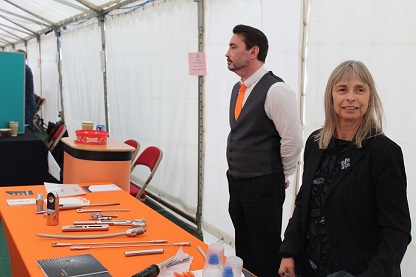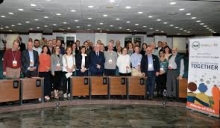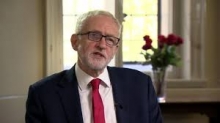Work TV
Watch our TV Channel dedicated to the ‘World of Work’. Explore our video library for informative videos featuring career opportunities at leading companies, franchising opportunities, further education and recruitment professions and their services.
Simon Collyer
Tendring Jobs & Careers Fair
JOB FAIR - Tendring Jobs & Careers Fair will be held on Tuesday 1st October, from 10:00am- 4:00pm at the Princes Theatre, Town Hall, Clacton on Sea.
Hundreds of jobs will be available and there will be approx. 55 national and local employers exhibiting.
We met these hairy chested fireman outside the Princes Theatre. Inside we chatted with a variety of exhibitors including StayLock, a Company that is supplying rigging to the Clipper Cup, Round the World Yacht Race.
A flying visit for us. The place was buzzing and it looked a very well run event. We are sure it will do some good.

Image: Tendring District Fireman at the Westcliff Theatre.

Image: StayLock show their wares.
ABC comment have your say below:

20% Rise In Homeless Deaths
Homelessness - Liberal Democrat MP Layla Moran has renewed her call for the Vagrancy Act to be scrapped following the publication of new ONS statistics revealing a rise in the deaths of homeless people in 2018.
The ONS data shows that there were an estimated 726 deaths in 2018, an increase of over 20% on the previous year. The highest numbers of deaths were recorded in the North West (77) and in London (110).
ABC comment, have your say below:

Jacques Vandenschrik, President of the European Food Banks Federation, Calls For Unity
UNITY SPEECH - Europe is going through difficult times both in its relations with the rest of the world and in its infighting between Member States and even between regions.
The European Union’s founding values are undermined by the incessant attacks of those who want its annihilation to better ensure their political and economic supremacy and by the selfishness which, like a cancer, insidiously disturbs the equilibrium and sends putrid metastases among its members, putting in danger the 'Union in Diversity': cornerstone of the European edifice.
In so doing, the longed-for objective of the Fathers of Europe is in jeopardy. The 'Pax Europeana'. Peace between nations, of course, but peace between people also. Identity crises are promoted by policies that turn fear into hatred: hatred of the foreigner, the migrant, the different. Has the world not evolved? Is the interdependence of the Member States in Europe a concept too distant to impose definitively a supranationalism built on peace, solidarity and richness in diversity?
Problems on the confines of our Eastern borders, inward looking, brinkmanship and the challenge to the rule of law among certain Member States constitute the main political tensions that the European Union must face. To these issues, we should add the haunting climate problem, as well as the technological, cybernetic, economic, migratory and social challenges. It is inconceivable to address these issues alone. The European Union is unavoidable. Fortunately, it is likely that following the strong lessons from the past, heightened awareness of the importance of bringing Europe closer to the citizen, parliamentarians and executives will make it evolve towards more dynamism, perceptiveness, reactivity, generosity and equity.
It is obvious that the general context outlined in the above introductory paragraph seriously impacts on the cohesion policy and the means at the disposal of the Member States. Social policies and budgets are not immune to the general situation, the result of which will be even more distressing when the economic recession, which appears to be imminent, comes into play.
Rightly, and in full agreement with the provisions of the Maastricht Treaty, the European Union applies the principle of subsidiarity in the use of the budgets of the future European Social Fund Plus (ESF+). The ESF+ is nothing else than the merger of several funds that the Member States can co-finance on a voluntary basis. The FEAD (Fund for European Aid to the most Deprived) is part of these merged funds in the ESF+ and most of this fund is devoted to food and basic material assistance.
Food and basic material assistance dedicated to the most unfortunate in our society - that is to say to more than 30 million people in a situation of severe material deprivation - has thus been heckled from one European budget to another between the PEAD depending on the Common Agricultural Policy before 2014, the FEAD depending on social policies since 2014 and the ESF+ from 2021. These developments have, on each occasion, created anxiety among those who take care of the organization or benefit from food and basic material assistance. The engulfment of the FEAD in the ESF+ makes them right!
It is a lack of insight to equate food and basic material assistance with other social supports. Because over the years, this support has become a complete or almost complete feeding source for many beneficiaries. It is above all a support to health and its maintenance.
As recently proclaimed by Pope Francis, "this does not mean merely offering benefits but rather providing an initial tangible gesture of accompaniment on the path of liberation." Food and basic material assistance in particular are likely to promote and maintain a state of health compatible with a social and human activity as harmonious as possible. One third of food aid recipients are under the age of 18! Food aid precedes social assistance often, not always!
The FEAD budget, an essential solidarity fund for Europeans, represents a budget of more than EUR 3.8 billion for the 2014-2020 period. The European Commission has proposed that the ESF+ budget should be set at just over EUR 100 billion and that Member States should devote 2% of the budget to food and basic material assistance for the period 2021-2027. This would result in halving of the budget allocated for food and basic material assistance. Of course, the European Commission would like the Member States to allocate up to 4% of the ESF+ budget to Food and basic material assistance but does not make it an obligation. This is neither fair nor generous, nor dynamic or responsive! The latitude of the Member States to increase or not the allocated budget to Food and basic material assistance would inevitably lead to the impoverishment of the poorest people in the poorest countries of the European Union.
This lack of equity will, in some countries promote the temptation to reserve the available means to the country’s citizens to the detriment of the people in the process of migrating.
This lack of generosity would have serious consequences for the health of the needy. The variety and quality of food would inevitably suffer from it. Too tight budgets force the authorities to reduce quality requirements in the face of increased required quantities and lead to disasters!
This lack of reactivity would have serious consequences for the safety of the communities in which most deprived people survive. Would some of them be pushed to steal to ensure their daily bread? Or would they prefer their children to steal and pilfer? Would they not be reduced to support even in the ballot boxes ideologies of the impossible humanity?
Would it not be better to enforce the 4% and allow a decrease of this funding based on a real and proven reduction in poverty? A dynamic approach to the financing of precarity is a factor participating in economic growth; many studies demonstrate this. Citizens are better and more involved in the economy, health care expenses related to food deficiency and junk food is decreased, people's self-esteem is improved, and citizenship is enhanced.
The impact of sufficient food aid supported by a warm and friendly human framework reinforcing social cohesion motivates the hundreds of thousands of people, volunteers and non, who animate local charities. These citizens of high moral value put all their hopes in the European Union and its Member States: generous and voluntary who support, in the line of the principle of subsidiarity, the initiatives of the social forces uniting competence and sensitivity to the needy.
The Food Banks of Europe support these charities with persistence and determination. Many invest in the management of food aid from the FEAD but all fight against food waste and hunger to contribute to European social cohesion in solidarity.
Let us not be afraid of words: hunger still exists on our continent, in our countries, our regions, our towns and villages. Hunger is a crime against humanity! Decision makers, help us denounce it, fight it, eradicate it!
ABC comment, have your say below:

The European Food Banks Federation Updates Us
IMPORTANT DATES - The European Food Banks Federation has brought to our attention some useful dates:
16 Oct: World Food Day
17 Oct: International Day for the Eradication of Poverty
22-23 Oct: Child Guarantee Expert Workshop - Children living in precarious
Nearly a third of all food produced in the world goes uneaten each year, an amount that costs the global economy $940 billion and emits 8% of planet-warming greenhouse gases. At the same time, 1 in 9 people is undernourished.
ABC Comment, have your say below:

Promises, Promises, Promises - The Election Guide to UK Political Parties Pledges
ELECTION PROMISES - Benefits and Work have produced this wonderful round up of election promises. Here is what they have to say:
First up, Labour are pledging to abolish universal credit, scrap sanctions and axe the bedroom tax.
They are even offering to take us back to the future, by doing away with the DWP and reintroducing the DSS.
Plus, they are planning to fund 200 community lawyers and a network of law centres.
The Tories, meanwhile, are in a bidding war with Labour over who can offer the biggest increase in the national living wage.
But we suspect that the new work and pensions secretary’s glorious undertaking to “continue to improve universal credit” is going to be less of a vote winner.
Positive PIP Guidance on Chronic Pain
This week the DWP updated their guidance to health professionals carrying out PIP assessments.
It contains a positive change for claimants who have to live with chronic pain.
Up until now, health professionals have been free to make the lazy assumption that claimants who are not prescribed strong painkillers can’t be in much pain.
So, any claims that pain limits their ability to carry out activities can be ignored.
However, the new guidance tells them that “the level of analgesia used does not necessarily correlate with the level of pain.”
The guidance points out that GPs are encouraged not to prescribe strong painkillers for long-term pain because of the harm they can do the patient.
In addition, some patients may be intolerant to analgesics or they may be using other methods of controlling pain.
Health professionals are told that instead of relying solely on the amount of medication as evidence, they should expect the claimant to be able to describe:
- the location,
- type,
- severity and
- variability
- of the pain they experience and the impact it has on their daily life.
So, as always, it’s vital that you give as much detailed evidence as possible about how your condition affects you.
But, provided you do so, the result should be a better chance of getting the correct award without having to go to an appeal tribunal.
An End to Universal Credit, Sanctions and The DWP
Labour are promising sweeping changes to the benefits system if they win an election.
Though, at the moment, it is not at all clear how they would achieve their most headline grabbing offer, the killing-off of universal credit
As the Institute for Fiscal Studies pointed out, so far the details of their proposals do not “amount to anything close to a scrapping of universal credit”.
Nevertheless, the clear undertakings they have given would improve the lot of many claimants.
They include:
* Scrapping the two-child limit, the benefit cap and the bedroom tax
* Ending benefits sanctions
* Removing the 5 weeks wait for a first payment of UC and making an interim payment after two weeks
* Ending the requirement to claim UC online
* Hiring an extra 5,000 advisers to help people unable to make an online UC claim
* Abolishing the DWP and replacing it with a Department for Social Security
For our (very much) younger readers, the DSS was the former name of the DWP until it was rebranded in 2001 by Blair’s Labour government.
So reintroducing the DSS would be a step back in time and could well amount to nothing but a nostalgic PR exercise.
But if the next government genuinely adopted the ethos set out by Margaret Greenwood, shadow secretary of state for work and pensions of “a social security system designed to end poverty, based on principles of dignity and universalism”, then that might actually make a difference.
Here at Benefits and Work, however, we won’t be holding our breath.
Community Lawyers and Law Centres
Labour’s proposal to fund 200 community lawyers and a network of law centres is one that few claimants would find fault with.
Except perhaps to argue that an awful lot more than 200 lawyers are needed.
But it would be a welcome move away from the current policy of making it almost impossible for most claimants to get timely, face-to-face help with their claims and appeals.
Just as importantly, it is very often advisers taking individual cases to the upper tribunal that result in changes to the law. These in turn can help many thousands of other claimants get the benefits they are entitled to.
So, even 200 new lawyers could make a serious difference.
National Minimum Wage Bidding War
Labour and the Tories appear to be involved in a national minimum wage price war as an election draws nearer.
The Tories have now announced a target of raising the national living wage to £10.50 an hour by 2024 and reducing the age limit for eligibility from 25 down to 21.
Labour, however, have described the plan as a “pathetic attempt at catch-up” by the Conservatives.
They point out that Labour’s 2017 manifesto promised a national living wage of at least £10 an hour for all workers over 16 by 2020.
By 2024 that would be worth £10.81.
Either way, it’s a small crumb of potentially good news for those on the lowest pay.
Tories Pledge to Continue to Improve UC
We are tempted to refer to the latest secretary of state for work and pensions simply as [insert name here].
The chances of Therese Coffey still being in post in a few months’ time, whoever wins the election, are pretty slim.
And the chances of her making any difference to anything whilst in post are probably even slimmer.
Her claim that:
“Universal Credit provides a safeguard for the most vulnerable in our society. It supports strivers, who are not content living a life on welfare.”
doesn’t suggest that she is amongst the most insightful or honest occupiers of the post.
Whilst her big offer to voters:
“To continue to improve Universal Credit to ensure people get the money they need in a timely manner, are helped into work, and onto an escalator up to better work.”
is as uninspiring as it is unlikely to be fulfilled.
Perhaps most bizarre of all is her announcement of a:
“£4 million package to support people to find not just any job, but that dream job.”
If your dream job is to be paid huge amounts of money to make entirely meaningless promises, mixed with offensive stereotypes, to a packed conference hall, then we are really sorry.
Therese got there before you.
ABC Comment, have your say below:

National Youth Homeless Strategy Petition Signed by 10,700 People
HOMELESSNESS - The Social Democrats today committed to a national Youth Homeless Strategy to make sure that young people are no longer left behind in the homeless crisis.
Focus Ireland a homeless charity is to deliver a petition signed by over 10,700 people calling for a national Youth Homeless Strategy. ... The petition is calling on all political parties to include a commitment to a national Youth Homeless Strategy in their manifestos for the forthcoming general election.
The Social Democrats party’s political director and by-election candidate for Dublin Mid-West, Anne-Marie McNally said:
“Young people are being severely impacted by the appalling homeless crisis with the number of homeless 18 to 24-year-olds soaring by 82% in four years. The latest official homeless figures for
August show that there are 910 young people living in emergency accommodation.
“But this is really only the tip of the iceberg because the figures don’t include the many young adults who are sleeping on friends’ sofas or moving back in with their parents. Neither does it factor in the reality that almost an entire generation are trapped in precarious housing situations in a private rental sector where they have little to no security of tenure and constantly live with the fear of losing the roof over their heads.
"Fine Gael’s one-size fits all approach to homelessness is already an utter failure. But it is particularly damaging to young people, including the most vulnerable people leaving state care and LGBTQ+ people who are already at a higher risk of homelessness.
“The Social Democrats fully support today’s petition by Focus Ireland and will include in our general election manifesto a commitment to a national Youth Homeless Strategy as a key priority. This will include actions to:
• Prevent young people from becoming homeless in the first place.
• Give tenants greater security to stem the flow of young people into homelessness.
• Deliver services and emergency accommodation for young people that meets their specific needs.
• Ensure that vulnerable young people leaving state care have a secure home to go to.
• Deliver homeless services that are LGBTQ+ friendly.
ABC comment, have your say below:

Freelancers Feel the Threat of a Brexit No Deal
STRUGGLING FREELANCERS - Following the news that Boris' final offer to the EU in a last-gasp attempt to salvage a deal has already been deemed unacceptable by the Irish government, the UK economy stands to lose a huge chunk of the income generated by the near 5 million freelancers across Britain the CEO Nick Woodward, CEO of ETZ Payments.
Freelancers and gig-economy workers currently contribute roughly £130 billion to the UK's economy, but many are already in dire financial straits. In the event of a no-deal Brexit, it is likely that we would see a huge drain of highly skilled freelancers back to the continent, leaving the UK with a major lack of freelance talent. Furthermore, the EU VAT refund system would no longer be available to UK freelancers in the EU or EU freelancers in the UK, leading to administrative burdens and delays in receiving refunds for the gig economy workers. Both UK freelancers in the EU and those from Europe working in the UK may also have to start paying social security contributions to both the UK and their country of origin, which could dissuade them from staying in their foreign country.
ETZ Payments' research reveals that 2.6 million skilled freelance workers regularly miss bill payments due to not being paid on time and have had to turn to payday lenders due to unstable pay. A no-deal Brexit is set to have major repercussions says Nick which will make earning a living from freelancing an even more daunting prospect.
ABC Comment, have you say below:

Ireland Fuel Allowance News
FUEL ALLOWANCE - The Department of Employment Affairs and Social Protection’s Fuel Allowance 2019 / 2020 season will begin today, Monday 30 September.
The weekly rate of the Fuel Allowance will be €22.50 while the value of the lump sum payment that will be paid to the householders who have opted for this payment is €315 (which will be paid next week also).
Overall, in excess of 370,000 households will benefit from the Fuel Allowance payment with some 60,000 of these receiving their allowance via lump sum. The estimated expenditure for the 2019/2020 fuel season is approximately €240 million.
Minister Doherty said:
“With the fuel season starting next week, the Fuel Allowance will be paid to thousands of households depending on welfare payments. This is an important support for many low-income urban and rural households for whom the cost of heating oil, electricity or solid fuel can be quite stressful. Because of its valuable assistance to so many people, in the last Budget, I ensured that the allowance was increased by an extra week to 28 weeks.”
This non-statutory Fuel Allowance scheme helps householders on long-term social welfare payments to cover additional heating expenses in the winter. People who qualified for the Fuel Allowance payment last year will automatically be included again this year, if they still fulfil the eligibility requirements.
Customers who have not previously received the payment can apply by contacting their local Intreo Centre or from the office which handles their scheme payment at 01 7043000.
The Fuel Allowance of €22.50 per week represents a contribution towards a household’s normal heating expenses. One Allowance is paid per household; it is not intended to meet the entire cost, but to provide assistance.
As an alternative to a weekly payment, householders also have the option of receiving their Fuel Allowance in two lump sum payments, the value of each being €315. Householders who have already chosen this option will receive their first lump sum along with their primary social welfare payment on their appropriate payment day this week. The second lump sum payment will issue during the second week of January 2020.
Further information
A person who is receiving a Natural Gas or Electricity Allowance under the Department of Social Protection’s Household Benefits Package, and who uses gas or electricity for their heating, may be entitled to the Fuel Allowance.
A person may qualify for Fuel Allowance if they are getting one of the following payments from the Department of Social Protection:
- State Pension (Contributory) or State Pension (Non- Contributory),
- Widow's, Widower's or Surviving Civil Partner's (Contributory) or (Non-Contributory) Pension,
- Incapacity Supplement,
- Blind Pension,
- Invalidity Pension,
- Disability Allowance,
- Deserted Wife's Benefit or Allowance,
- One-Parent Family Payment,
- Guardian's Payment (Contributory),
- Guardian's Payment (Non-Contributory),
- Farm Assist,
- Long-term Jobseeker's Allowance,
- Basic Supplementary Welfare Allowance,
A person may be entitled to the Fuel Allowance if they are getting one of the following payments from the Health Service Executive:
- Disabled Person's Rehabilitation Allowance,
- Infectious Diseases Maintenance Allowance,
- a social security payment from another country,
- a special Department of Defence Allowance,
or
If they are taking part in an employment or educational scheme and they are entitled to keep their secondary benefits,
and
- they are normally living in the State,
- are living alone or only with:
- a qualified spouse, civil partner, cohabitant or qualified children*,
- other people getting one of the payments listed on page 3 who would also qualify for Fuel Allowance in their own right,
- a person who is providing full-time care and attention if the applicant has a disability or long-term illness,
- a person getting short-term Jobseeker’s Allowance,
and
- the applicant and other members of their household are unable to pay for the heating needs from their own resources. To meet this condition, the household must satisfy a means test.
A qualified child is under age 18 or aged 18 to 22 if in full-time education. If a child turns 18 while in full-time education and the applicant for the Fuel Allowance is getting Jobseeker’s Allowance (for less than 15 months), Jobseeker’s Benefit, Illness Benefit or Supplementary Welfare Allowance, they will remain a qualified child only until they finish full-time education or until the following 30 June, whichever is earlier.
Full information is available on the Department of Social Protection Website here:
ABC Comment, have your say below:

Labour’s Plan to End ‘Cruel’ Universal Credit Welcomed By Unite
UNIVERSAL CREDIT - The announcement (Saturday 28 September) that a Labour government will abolish the ‘cruel and miserable’ Universal Credit (UC) system has been warmly welcomed by Unite, Britain and Ireland’s largest union.
Unite has been campaigning for the reform of the system since its inception but given its manifold problems and the human suffering it led to, switched to calling for its end.
UC is meant to streamline six existing welfare payments into one, but Unite said that the introduction has been ‘inherently flawed’ resulting in unacceptable delays, the soaring use of food banks and some claimants becoming suicidal.
Unite head of community Liane Groves said:
“The announcement today by the Labour party is to be warmly welcomed. Unite has been campaigning ceaselessly in recent years to see the end of UC which will affect up to seven million people in and out of work if it is fully rolled out.
“The system is inherently flawed as it makes people wait five weeks without any money coming in. People, desperate to put food on the table and keep a roof over their heads, are plunged into a sea of debt from which they can never escape. This state-sponsored despair must cease.
“This announcement from the Labour party is a beacon of hope for tens of thousands of people whose lives have been made a misery by the cruel and flawed implementation by Tory ministers hell-bent on their austerity agenda, whatever the human cost.
“While the details of what an incoming Labour government will replace UC with are still to be refined, it should be based on the principles of social justice and the objective of ending poverty, including immediate steps to give relief to those struggling and a commitment to develop a replacement to UC in the first few months of a Labour government.
“Any new welfare system should have an individual’s personal circumstances as the priority and not the current tick-box assessments which have been pockmarked by unacceptable delays which have driven some claimants to the brink of suicide.”
Earlier this month, Unite issued a ‘bombshell’ report and survey of nearly 1,200 Universal Credit claimants by the union’s Community section which laid bare the misery of the scheme’s failed introduction with evidence of people becoming suicidal, going without food, being forced into debt and unable to pay bills.
The survey of 1,173 Universal Credit claimants found that 70 per cent had skipped meals and 42 per cent had been forced to use a food bank as result of claiming Universal Credit.
ABC Comment, have your say below:

Simon Heads For Japan on a Sponsored Photo-Journalist Trip
INTERNATIONAL OPPORTUNITY - Not a normal week we can assure you, but the ABC and the quality of articles we write and publish is getting attention. We have had a huge surge in visits to our website this week. In fact, we are slightly baffled what has caused this sudden extra attention?
Next year is the Olympics. The 2020 Summer Olympics will begin on Friday 24 July and and ends on Sunday 9 August. People will learn a lot more about this fascinating and mysterious country.
Press Release
Simon Collyer, the Colchester based founder of the Association of Pension of Benefits Claimants CIC, also known as the ABC, has been given a prestigious opportunity to travel to Japan as guest of the Japanese’s authorities.
The mission set is to write about two tourist destinations, Wakura Onsen based on the coast, in the spectacular Noto Peninsular and Nozawa Onsen one of Japans leading ski resorts based in the Hokurike mountains, one of Japans leading inbound ski resorts. The government wants to attract European tourists to visit this location in the ‘green season’.
Both locations are in Ishikawa Prefecture and Simon and his guides will be travelling up the spectacular Dragon Route as it is called, to Wakura Onsen from Chubu airport in central Japan.
Onsen are hot volcanic springs which have waters in different colours depending on the minerals present. ‘Mixed bathing is out’ says Simon - bathers enter in the nude and put their towels on their heads once in the water to keep them dry. The springs are reputed to have significant health benefits.


Image: The Nobo Penninsular
There is a full programme of activity, Sea Kayaking to an uninhabited island, swimming with Dolphins in the wild, fishing and running about on the ocean inside a large inflatable ‘bubble’ that ‘floats on the sea’ say the organizers. Also watching Firefly squid and much more. The amazing ‘Notojima Aquarium’ is well worth looking up on YouTube’ says Simon.

Image: A Peaky Blinders Haircut if ever we saw one.
The second venue Nozawa Onsen, is nestled in what is called the Japanese Alps is generally crowded with skiers in the winter. Guest journalists will be mountain biking guided by a famous mountaineer and guide. ‘A long ride, all downhill fortunately’ says Simon.

Image: Nozawa Onsen.
Ishikawa is known for its scenery and its culture, in particular exquisite lacquerware. The formal Japanese Tea Ceremony originated in the province.
Simon has appeared on BBC Look East and BBC Radio Essex this year and twice recently on the RT TV (formally Russia Today) evening news. Simons ABC organisation started to get noticed after they were invited to the final press conference by Prof. Philip Aston, the United Nations special reporter on poverty. The ABC has over 3,000 articles on-line and is known for the depth and quality of their articles. The ABC was founded to improve this image of those on state funding and to provide signposting and ideas. Simon was a core team member on the Via Sacra Walk with Sir Anthony Seldon in 2016 along the Western Front as it was in 1916, from Switzerland to the Belgian Coast.

Image: The oldest hotel in the world.
This will be a chance to increase my knowledge about Japanese society say Simon and build important contacts for the future. I am very privileged to be selected to go. Japan is an amazing country and Ishikawa should be on every travellers bucket list of places to go.’
Image: Swimming with Dolphins in Ishikawa.
Here is some videos about the region:
Ishikawa Prefecture: https://www.youtube.com/watch?v=cJLjW625V7I
Wakura Onsen: https://www.youtube.com/watch?v=-6PevN5CvNw
https://www.youtube.com/watch?v=4PwKcMkh2FI
https://www.youtube.com/watch?v=Dx1onCNOqQs
https://www.youtube.com/watch?v=DrrViLoli_0
Notojima Aquarium: https://www.youtube.com/watch?v=hD8TFLD4xkg
Nozawa Onsen: https://www.youtube.com/watch?v=tKusMRCJS74
ABC Comment, have your say below:


























